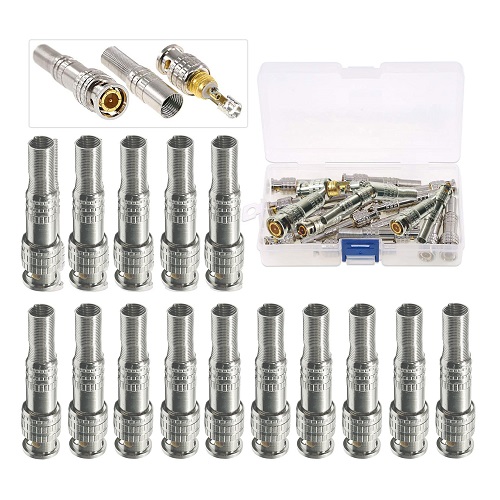A BNC (Bayonet Neill-Concelman) male connector is a coaxial cable connector designed for safe and reliable transmission of high-frequency signals. It is commonly used in a variety of applications, including video, audio, data transmission, and communication systems. BNC Male Connectors are designed for easy installation and provide a stable connection for analog and digital signals.
BNC connectors are commonly used in environments that require stable, high-quality signal transmission, including broadcasting, CCTV systems, and telecommunications. The male version of the BNC connector is typically used to connect to a female BNC socket or port, with a simple twist-lock mechanism to ensure a secure installation.
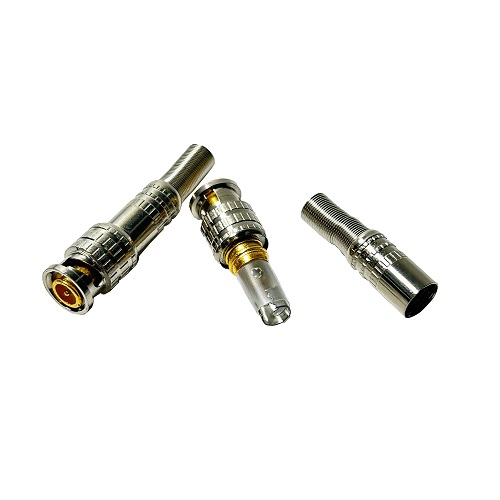
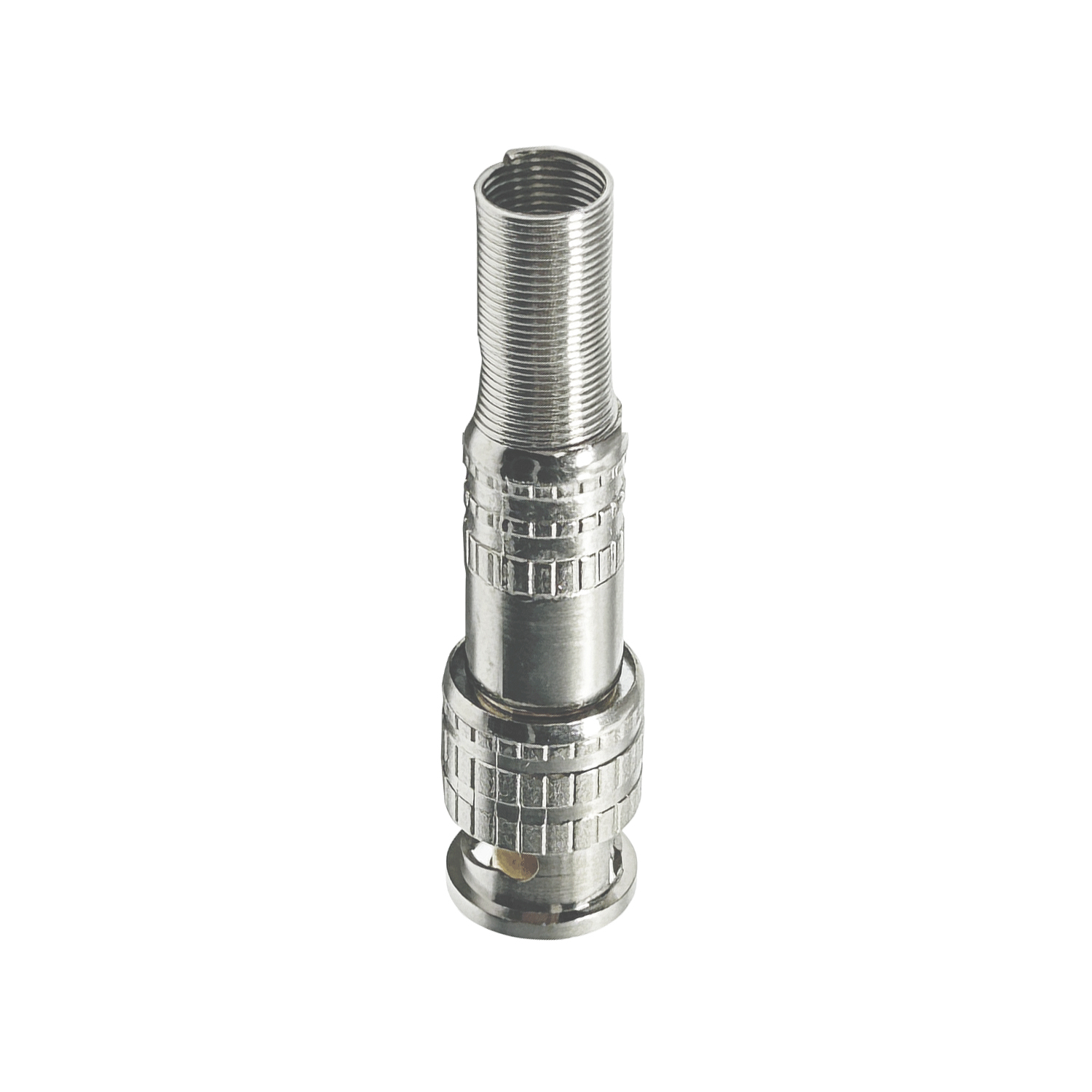
Materials and Construction of BNC Male Connectors:
BNC male connectors are typically made of high-quality materials to ensure signal integrity, durability, and long-term reliability. Some common materials include:
Connector Body:
Brass: The connector body is typically made of brass, which has high mechanical strength and excellent conductivity. Brass ensures that the connector maintains durability under pressure and minimizes signal loss.
Nickel-plated brass: The brass body is typically plated with nickel to increase corrosion resistance, ensuring that the connector will not rust or degrade when operating in harsh environments.
Pins and Internal Contacts:
Gold-Plated Contacts: Internal pins and contacts are often gold-plated to reduce signal loss due to oxidation and maintain a high-quality connection over time. Gold plating also enhances conductivity, minimizing the risk of signal degradation and ensuring reliable performance.
Insulation:
PTFE (Polytetrafluoroethylene): The insulation material used in BNC male connectors is often PTFE, known for its excellent electrical properties, high dielectric strength, and resistance to heat and moisture. This material ensures a stable connection and minimizes signal interference.
Housing and Cover:
Nickel-Plated Steel or Zinc Alloy: For added durability and protection, the housing of BNC male connectors is often made of nickel-plated steel or zinc alloy, which is resistant to physical wear, corrosion, and electromagnetic interference (EMI).
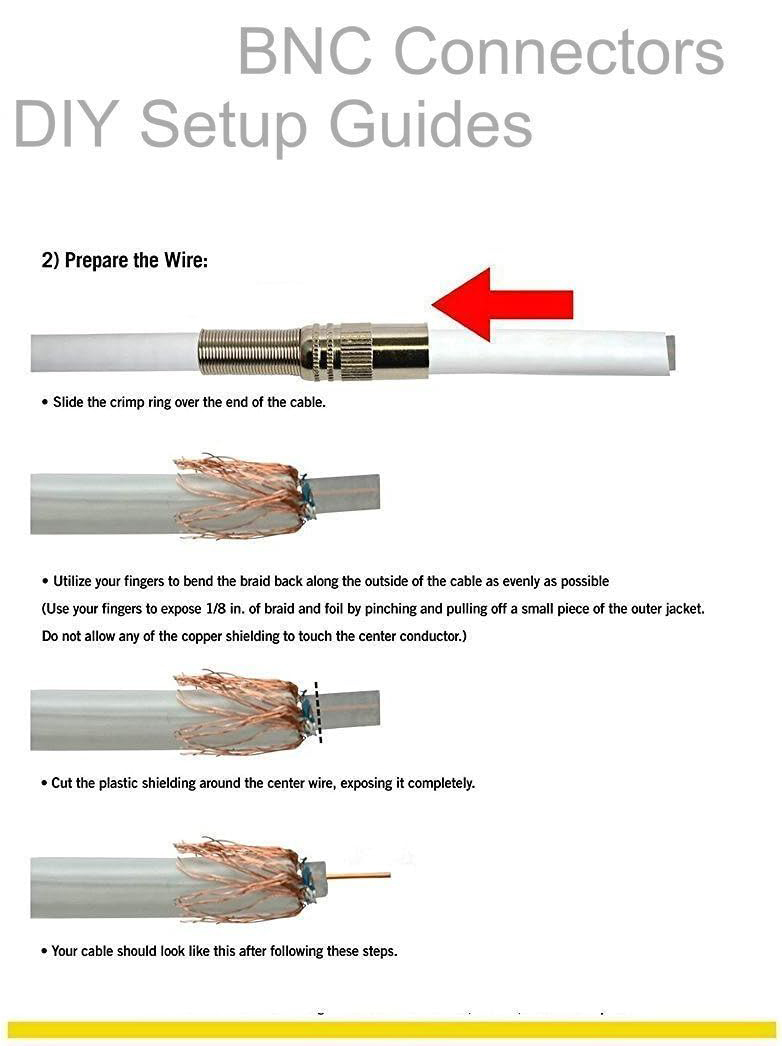
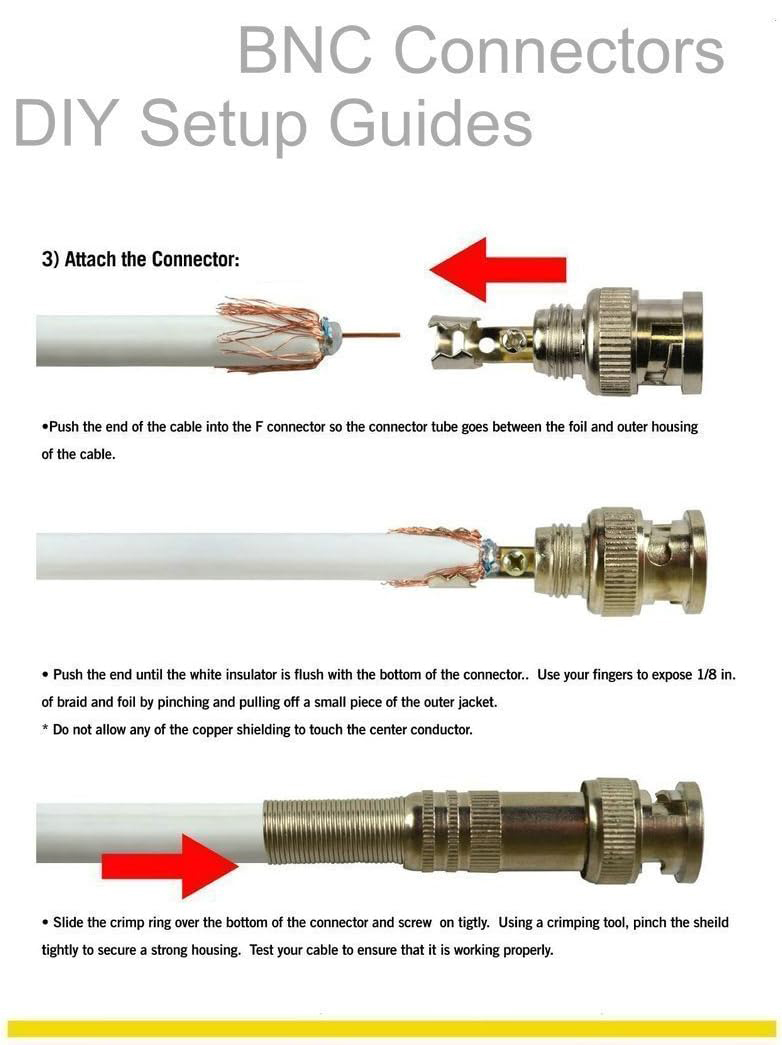
Features of BNC Male Connectors:
Bayonet Locking Mechanism: BNC connectors are known for their bayonet locking mechanism, which makes them easy to connect and disconnect. This feature ensures that the connector remains securely connected once it is locked in place, even in high-vibration environments.
Wide Frequency Range: BNC connectors are designed to handle a wide frequency range, making them ideal for both low- and high-frequency applications.
Durability and Long-Term Performance: The high-quality materials used in BNC male connectors ensure excellent durability, making them suitable for demanding applications such as broadcast and surveillance systems.
Compatibility: BNC connectors are standardized and can be easily interchanged with similar products around the world, making them ideal for systems that require component interchangeability.
Low Signal Loss: The connectors are designed to minimize signal loss and interference, ensuring reliable transmission of audio, video, and data signals.
Versatility: BNC male connectors are suitable for a variety of cable types, including RG6, RG59, RG58, and more, depending on specific application requirements.
Applications of BNC Male Connectors:
BNC Male Connectors are widely used in a variety of industries and applications. Some of the most common uses include:
1. Broadcast Television Systems:
Video Signal Transmission: BNC Male Connectors are widely used in broadcast television networks, cable television (CATV), and other video-based systems to connect cameras, monitors, and transmission equipment. They are designed to transmit high-quality video signals with minimal loss or distortion.
Broadcast Equipment: BNC connectors are used to connect broadcast equipment such as video servers, switchers, and cameras. Their ability to handle high-frequency signals makes them suitable for high-definition video transmission.
2. Surveillance Systems:
CCTV Cameras: BNC Male Connectors are commonly used for video signal transmission in CCTV (Closed Circuit Television) security systems. The connectors help establish a secure, high-quality connection between the camera and the recording or monitoring equipment, ensuring clear video footage and reliable monitoring.
3. Telecommunications:
Data Transmission: BNC connectors are used in data transmission applications, especially in telecommunications and networking systems where signal integrity is critical.
Fiber Optic Systems: In some cases, BNC connectors are used in fiber optic systems to convert electrical signals for compatibility with fiber optic cables.
4. Test and measurement instruments:
Signal testing: BNC connectors are often used in test and measurement instruments such as oscilloscopes, spectrum analyzers, and signal generators. They provide a stable, secure connection for transmitting test signals between devices.
5. Audio equipment:
Audio transmission: In professional audio systems, BNC connectors are sometimes used to connect audio equipment such as mixers, amplifiers, and sound processing equipment. They are able to handle high-frequency signals, making them suitable for audio and video applications.
6. RF (Radio Frequency) Systems:
RF signal connections: BNC connectors are often used in radio frequency (RF) systems to connect antennas, transmitters, and receivers. They are able to handle high-frequency signals without introducing noise, making them ideal for RF applications.
7. Networks:
Computer networks: In some specialized network installations, BNC connectors are used for Ethernet connections and other types of data transmission systems. Although less common in modern networks, they were once widely used in coaxial network systems such as 10BASE2.
8. Military and Aerospace Applications:
Secure and Reliable Connections: BNC male connectors are also used in military and aerospace applications where secure, high-performance connections are required for communications, radar, and telemetry systems.
Related Connectors: F-Type Connectors:
F-Type connectors are another popular coaxial cable connector used in many similar applications. F-Type connectors are commonly used in CATV systems, especially residential and commercial television systems. Here are some key points about F-Type connectors:
Applications: F-Type connectors are widely used in 75-ohm cable distribution systems, including cable television (CATV), satellite television, and broadcast networks.
Design Features: F-Type connectors feature a screw-on connection design and are commonly used in impedance matching and non-impedance matching applications.
Compression Connectors: F-Type connectors are also available in compression style, designed for RG6 coaxial cables, commonly used in satellite, broadband internet, and other communication systems.
Compatibility: F-Type connectors are widely compatible with RJ45 Cat5/Cat6 connectors, ensuring flexibility in communication systems.
The FL10 product, with a M10X0.75 thread size, is another specialized product that has similar construction and performance characteristics to the F-type connector, but is typically used in more specific applications that require specific thread specifications.
BNC male connectors are an essential component in high-frequency signal transmission, providing safe and reliable connections for applications such as broadcasting, telecommunications, CCTV, test equipment, and more. Made of high-quality materials such as brass, gold-plated contacts, and PTFE insulation, BNC male connectors ensure minimal signal loss, high durability, and excellent electrical performance.
Whether used for video surveillance, audio systems, or telecommunications, BNC male connectors are a versatile and rugged choice for demanding applications that require reliable connections. FANGBE's BNC connectors provide the flexibility and durability required for modern communications and electronic systems.


